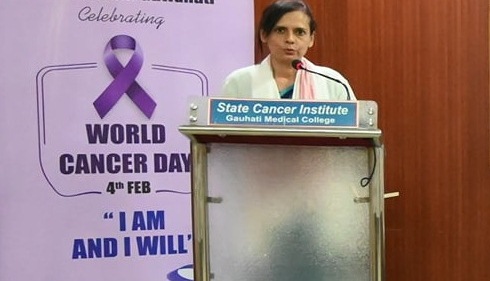
Increase screening, bombard people with info urgently to tackle cancer in Northeast: Prof Neelakshi Mahanta
Bombarding people with cancer-related information so that they can see them wherever they turn their heads coupled with making cancer screening mandatory for everyone who visits a primary healthcare centre are some of the most urgent steps needed to battle the menace of cancer in the Northeast, says Professor (Dr) Neelakshi Mahanta, Head of the Department of Medical Oncology at State Cancer Institute, Guwahati,
According to available data, the Northeast has the dubious distinction of being the country's cancer capital with Kamrup Urban District being one of the worst affected districts, where one in every four people is at risk of developing the disease.
Part of the problem is socio-cultural, she said.
"Beyond recognising this fact and setting up healthcare facilities to treat cancer patients, a lot of work needs to be done in raising awareness of the people regarding the disease itself and promoting a lifestyle that minimises the risk of cancer," Prof Mahanta said.
“Whatever being done is very minuscule in terms of both visibility as well as impact and it has to be on a very large scale,” she said recently while talking to Drug Today Medical Times.
“If you look at the overall data, Assam is leading in many forms of the cancers and Kamrup Metro is leading especially in the incidences of cancer of the oesophagus, while the cases of oral cancer are more in Meghalaya and Mizoram leads in the number of incidences of stomach cancer,” she added.
“So what we are seeing is that most of the cancer cases in Northeast have something to do with the oral cavity and the digestive tract,” Prof Mahanta said.
“This can only be directly related to our habits, and by habits, I mean what we are eating, what we are consuming and what we are addicted to,” she stressed.
Stating that high incidences of both oral as well as oesophageal cancer can directly be attributed to the consumption of beetle and areca nut and keeping it in the mouth for a long time, Professor Mahanta said that the areca nut juices damage the epithelium leading to cancers on persistent use.
“Added to that the substance abuse in the form of tobacco and alcohol are also contributing to the increasing number of cases in this part of the country,” she pointed out.
"While the issue of tobacco use can be talked about, the chewing of areca nut is intimately integrated into the culture of the society, along with the livelihoods of a lot of people depending on them, which makes it difficult to be addressed," she stressed.
“Unless alternative professions are worked out and the people cannot be forced to give up the cultivation overnight; people will die of hunger if they do not die of cancer,” Prof Mahanta added.
“Cancer is very much a chronic lifestyle disease today and there should be an all-out effort directed towards rising the consciousness of the people, and this should start from childhood itself” she further added.
Stating that the cancer situation in the Northeast is worse now and teds to spiral out of hand Prof Mahanta said cancer screening, especially the screening for oral cancer must be made mandatory in each Primary Health Centres (PHC) across the region and more needs to be done to make people aware about the disease.
“All you need is some trained manpower and a lot of campaign materials loaded with infographics,” she pointed out.
Posters and pamphlets should be placed at every vantage location so that people are forced to notice them everywhere around them.
“Information about the early signs of cancer, the causes, the things that we should avoid to reduce the risk of cancers should become the new mantra of our life; people should be bombarded with information and every PHC should have a trained person and people should know where to get screened in case they start having symptoms.”
“There should be a mandatory screening of every person who comes to the PHCs for whatever reason,” Prof Mahanta said.
“Healthy lifestyle habits need to be inculcated from a very young age to prevent such diseases if we want to see the growth of a healthy nation,” she pointed out.
Drawing attention to the situation that every cancer hospital is overburdened with patients, Mahanta cautioned said, "Unfortunately, we still get to see mainly the more advanced cases when a cure is no longer an option and this is just the tip of the iceberg."
"It is high time we bring the conversation to the table and address the root causes, however challenging it might be," she added.